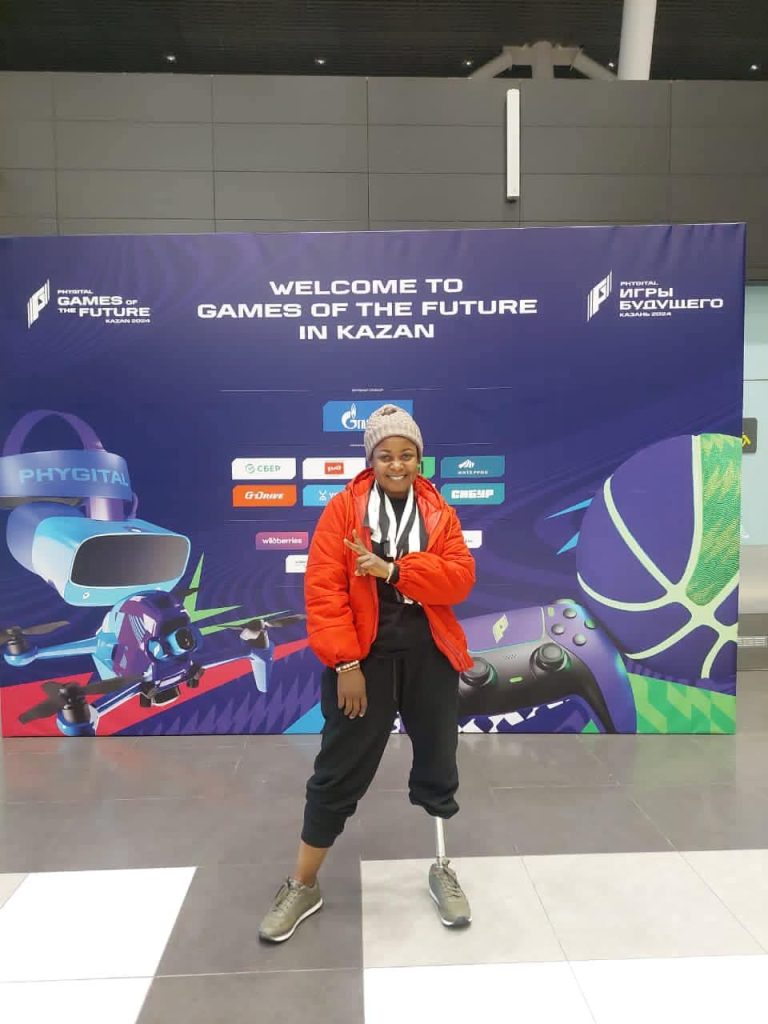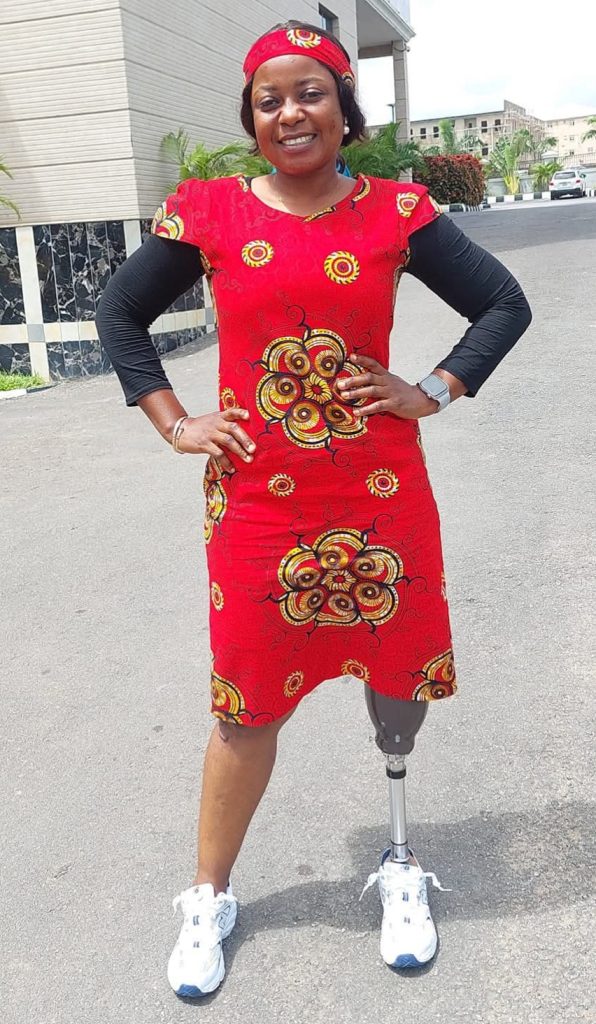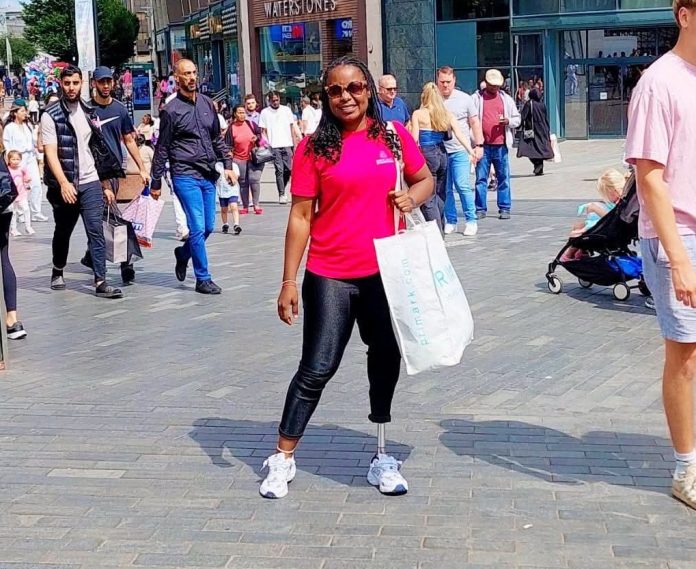On February 9, 2025, Aver Akighir marked 22 years since undergoing amputation—a significant moment of reflection on her journey, the challenges she has faced, and the strength that has carried her through. In our commitment to amplifying the voices of persons with disabilities and highlighting their resilience, The Qualitative Magazine engaged Aver in an exclusive interview to share her story of survival, adaptation, and triumph.
TQM: Can you share the story behind your amputation? How did it happen?
Aver Akighir: It was a fateful day in Gboko, Benue State—February 9, 2003. I was on my way back from church when I was hit by a car. This happened just six months after I had completed secondary school. I woke up in Peniel Hospital, Gboko, with a severely broken left leg. A few days into my treatment, gangrene infection set in, and the only way to save my life was through amputation.
My parents struggled with the decision to sign the consent form for the procedure, but I knew every passing minute put my life in greater danger. So, I requested the form and signed it myself. If you know anything about gangrene, you’ll understand how life-threatening it can be.
The amputation was performed, and I remained in the hospital for three months—undoubtedly the hardest period of my life. When I was finally discharged, I returned home to an uncertain future. Throughout my stay in the hospital and even at home, I never once had a visit from anyone with a disability. I often cried, believing I was the only one living with a disability in the world.
My family—parents, siblings, and friends—struggled to understand how best to support me. At that point, I was extremely temperamental, lashing out at every little provocation. It was a tough period for all of us.

TQM: How did you feel when you realized your leg was going to be amputated?
Aver Akighir: I was heartbroken. I asked God thousands of questions, but I got no answers. I was devastated, but I was also determined to survive. My loved ones were waiting for me, and I knew I had to fight for my life. It was the hardest, most terrifying time of my life.
TQM: How did you cope during the early stage of your amputation? How did your family and friends react?
Aver Akighir: The early days were incredibly tough. I was broken, confused, and shattered. I had no idea what life would be like after amputation.
My family was heartbroken. This was their first close encounter with disability, and they didn’t know how best to help me. My friends and schoolmates were equally devastated. During my hospital stay and after I returned home, my house became the meeting point for them—they were always checking up on me, offering their support in whatever way they could.
TQM: At what point did you begin to recover from the shock?
Aver Akighir: It took me over a year. Most of my classmates had moved on to university, and their visits became less frequent. I was stuck at home doing nothing.
One day, I told my parents I was ready to go back to school. At that point, university admissions had closed, but fortunately, I secured admission into the College of Education, Katsina-Ala. After completing my studies there, I proceeded to Benue State University, where I earned my first degree.
TQM: What are the major differences between your life before and after amputation?
Aver Akighir: Before amputation, I could easily get up, run outside, and wear whatever I wanted—clothes, shoes, anything. But now, because of my prosthetic limb, I can’t wear just any type of shoes or clothes.
Moving around can also be challenging. Life before and after amputation are two completely different realities—both with their own mix of tough, sweet, and rough moments.
TQM: Do you have any regrets about things you might have achieved if not for the amputation?
Aver Akighir: No regrets at all. My amputation brought out the best in me. It made me more focused, determined, and hardworking. I love myself more now because this journey has shaped me into the person I am today.

TQM: What milestones have you achieved since your amputation?
Aver Akighir: I was able to return to school, pursue higher education, and acquire various skills. I learned several handcrafts and began offering counseling to accident victims in hospitals, encouraging them and their families.
I founded Hope Alive for Possibilities Initiative, an organization dedicated to supporting persons with disabilities.
I also own a bakery, where we make some of the best cakes and pastries in Nigeria.
Additionally, I host Possibilities with Aver, a TV show that tells the stories, challenges, aspirations, and triumphs of persons with disabilities.
TQM: What is your advice to the government regarding accident prevention and support for amputees?
Aver Akighir: Our hospitals need better equipment, and healthcare personnel require more training.
Drivers should reduce their speed and be more considerate of other road users.
There should be stronger support systems for accident victims, including counseling services and subsidies for mobility aids like prosthetic limbs, wheelchairs, and crutches.
TQM: What kind of support should families, friends, and society offer to amputees?
Aver Akighir: Family support is crucial. When a person with a disability has their family’s support, recovery becomes much easier.
Friends and society also have a major role to play. I was lucky to have incredible friends who stood by me throughout my journey. Their unwavering support helped me navigate the difficult times.
It hasn’t been an easy road, but I am grateful to God for how far I’ve come.

TQM: What advice do you have for other amputees and those who may face amputation in the future?
Aver Akighir: Focus on what you can do. Self-development is important.
Learn a skill, go out, and meet like-minded people. Do not isolate yourself.
Most importantly, remember that you are not alone.
TQM: Finally, what are your parting words?
Aver Akighir: Life goes on, no matter the challenges we face.
Pick up your broken pieces and move forward. Disability is not inability—you have so much to offer the world, and the world is waiting to see and hear from you.
You are the best and only version of yourself. No one can do it better than you.
Love and appreciate yourself every single day. Life is too short to dwell on what you cannot change.
Interview conducted by The Qualitative Magazine


